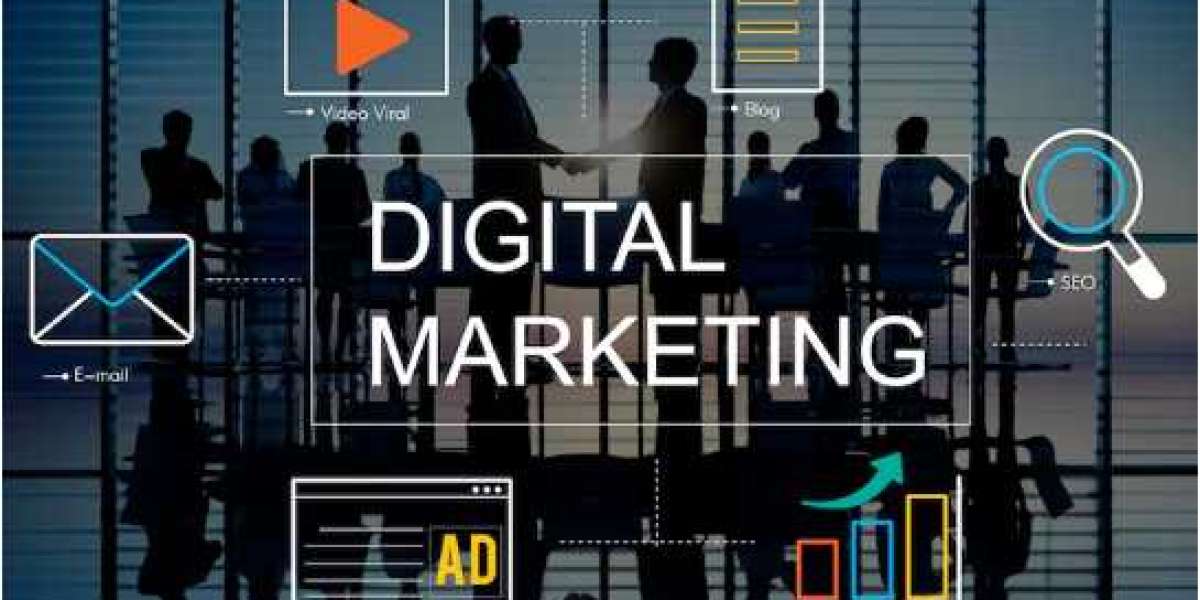In today’s fast-paced and connected world, digital marketing has become the cornerstone of successful business strategies. As consumers spend more time online, companies must embrace digital channels to reach, engage, and convert their target audience. Whether you're a small startup or a large corporation, Digital Marketing offers vast opportunities to promote products and services, build brand awareness, and drive revenue.
This comprehensive guide will explore the essential aspects of digital marketing, its key components, benefits, strategies, and how businesses can leverage it to thrive in the digital age.
What is Digital Marketing?
Digital marketing refers to all marketing efforts that use an electronic device or the internet. Businesses leverage digital channels such as search engines, social media, email, websites, and mobile apps to connect with current and potential customers. Unlike traditional marketing, which primarily focuses on billboards, TV ads, or print media, digital marketing allows businesses to reach a global audience, track customer behavior, and measure results in real-time.
Key Components of Digital Marketing
Search Engine Optimization (SEO): SEO involves optimizing your website to rank higher in search engine results pages (SERPs) for relevant keywords. The goal is to increase organic (non-paid) traffic to your website by making it more visible to users searching for specific terms. SEO includes on-page optimizations like keyword usage and meta tags, as well as off-page efforts such as backlinking and content promotion.
Content Marketing: Content marketing focuses on creating and distributing valuable, relevant, and consistent content to attract and engage a clearly defined audience. Content can take various forms, including blog posts, videos, infographics, eBooks, and case studies. The primary goal is to educate, entertain, or inform your audience while positioning your brand as a thought leader in your industry.
Social Media Marketing: Social media platforms like Facebook, Instagram, Twitter, LinkedIn, and TikTok provide businesses with opportunities to interact with customers, build brand awareness, and foster engagement. Social media marketing involves posting organic content, running paid ads, and leveraging influencers to connect with your target audience.
Pay-Per-Click (PPC) Advertising: PPC is an online advertising model where businesses pay a fee each time one of their ads is clicked. Google Ads is the most common PPC platform, but PPC campaigns can also run on social media platforms like Facebook, Instagram, and LinkedIn. The goal is to drive traffic to a website, landing page, or product page and encourage conversions.
Email Marketing: Email marketing remains one of the most effective ways to nurture leads, build customer loyalty, and drive sales. By sending personalized, relevant messages to segmented lists, businesses can keep customers informed, promote special offers, or share new product updates. Email marketing tools also allow you to automate sequences, track engagement, and optimize campaigns over time.
Affiliate Marketing: Affiliate marketing involves partnering with other businesses or individuals (affiliates) who promote your products in exchange for a commission on sales. Affiliates use their platforms, such as blogs, YouTube channels, or social media, to drive traffic to your website. This form of marketing can be highly effective when done with the right partners.
Influencer Marketing: Influencer marketing leverages individuals with large online followings to promote your products or services. Influencers have built trust with their audience, and when they endorse your brand, it can lead to increased visibility, credibility, and conversions. Influencer campaigns can be run on platforms like Instagram, YouTube, TikTok, and Twitter.
Mobile Marketing: With the increase in smartphone usage, mobile marketing has become a critical component of digital marketing. Mobile marketing strategies include mobile-optimized websites, SMS marketing, in-app advertising, and location-based marketing. The goal is to reach consumers on their mobile devices and offer a seamless, engaging experience.
Analytics and Data: One of the most valuable aspects of digital marketing is the ability to track and measure performance in real time. Tools like Google Analytics, social media analytics, and email marketing platforms provide detailed insights into campaign performance, user behavior, and ROI. By analyzing this data, businesses can refine their strategies, improve targeting, and make data-driven decisions.
Benefits of Digital Marketing
Global Reach: Digital marketing allows businesses to reach a global audience with minimal investment. Unlike traditional marketing, which is often limited by geography, digital channels provide the opportunity to market to customers across different regions, languages, and time zones.
Cost-Effectiveness: Digital marketing is often more affordable than traditional marketing methods. Small businesses can compete with larger companies by focusing on niche markets and using cost-effective strategies like SEO, content marketing, and social media. PPC advertising also allows businesses to control their ad spend and target specific demographics.
Measurable Results: One of the greatest advantages of digital marketing is the ability to measure the performance of every campaign. Businesses can track clicks, conversions, bounce rates, and other metrics in real time, allowing them to optimize their strategies and maximize ROI.
Personalization: Digital marketing enables businesses to create personalized experiences for their customers. By leveraging data and segmentation, companies can tailor messages, recommendations, and offers based on individual preferences, behaviors, and buying patterns.
Targeted Advertising: Digital marketing allows businesses to reach highly specific audiences through targeted advertising. Whether through PPC campaigns, social media ads, or email marketing, businesses can segment their audience by demographics, interests, behavior, and location to ensure their message reaches the right people.
Improved Engagement: Digital channels provide multiple touchpoints where businesses can engage with their audience. Social media interactions, blog comments, emails, and reviews all allow for two-way communication, building trust and fostering customer relationships.
Real-Time Interaction: Unlike traditional marketing methods, digital marketing allows businesses to interact with customers in real-time. This is particularly important for customer service, where businesses can respond to queries, address concerns, and resolve issues quickly via social media or live chat.
Flexibility and Scalability: Digital marketing offers flexibility in terms of campaign management. Businesses can start small with a limited budget and scale up as they see positive results. Additionally, digital marketing allows for A/B testing, enabling marketers to experiment with different strategies and optimize campaigns based on performance.
Digital Marketing Strategies for Success
Define Clear Objectives: Before launching any digital marketing campaign, it's essential to define clear objectives. Whether your goal is to increase brand awareness, generate leads, or boost sales, having specific goals will guide your strategy and help measure success.
Know Your Target Audience: Understanding your target audience is crucial for creating relevant and engaging campaigns. Conduct market research to identify your audience's demographics, interests, pain points, and online behaviors. This information will help tailor your messaging and choose the right platforms to reach your audience.
Create High-Quality Content: Content is at the core of every successful digital marketing strategy. Invest in creating high-quality, valuable content that resonates with your audience. Whether it's a blog post, video, or social media post, ensure that your content provides solutions, educates, or entertains.
Utilize Multiple Channels: Digital marketing works best when you use multiple channels to reach your audience. Combine SEO, social media, email marketing, and PPC to create a well-rounded strategy that maximizes exposure and engagement. However, ensure consistency in your messaging and branding across all channels.
Optimize for Mobile: With the majority of internet traffic coming from mobile devices, optimizing your website and marketing campaigns for mobile is essential. Make sure your website is mobile-friendly, and consider using mobile-specific tactics like SMS marketing and location-based ads.
Leverage Social Proof: Consumers trust recommendations from peers and influencers more than traditional advertising. Encourage customers to leave reviews, share testimonials, and engage with your content on social media. Influencer partnerships can also help build credibility and reach a wider audience.
Monitor and Analyze Performance: Regularly track and analyze the performance of your digital marketing campaigns. Use tools like Google Analytics, social media insights, and email marketing reports to gather data on what’s working and what’s not. Adjust your strategies based on these insights to continually improve results.
Stay Updated with Trends: Digital marketing is constantly evolving, with new trends, technologies, and algorithms emerging regularly. Stay updated with the latest industry developments to keep your strategies fresh and relevant. Experiment with new formats like interactive content, virtual reality (VR), or voice search optimization.
The Future of Digital Marketing
As technology continues to advance, the future of digital marketing looks exciting and full of innovation. Here are some trends to watch:
Artificial Intelligence (AI) and Automation: AI is already transforming digital marketing, with tools like chatbots, predictive analytics, and personalized recommendations. Automation will continue to play a significant role, allowing businesses to streamline processes, target customers more effectively, and enhance user experiences.
Voice Search Optimization: With the rise of smart speakers and voice assistants, optimizing content for voice search will become increasingly important. Marketers will need to focus on conversational language, answering questions directly, and ensuring their websites are voice-friendly.
Video and Interactive Content: Video content has become a dominant force in digital marketing, with platforms like YouTube, Instagram, and TikTok leading the way. In the future, expect more interactive content like polls, quizzes, and virtual experiences to drive engagement.
Augmented Reality (AR) and Virtual Reality (VR): AR and VR are poised to revolutionize digital marketing by offering immersive experiences for customers. Brands can use AR for virtual try-ons, interactive product demos, or enhanced in-store experiences.
Conclusion
Digital marketing is a dynamic, ever-evolving field that provides businesses with unparalleled opportunities to connect with customers, build relationships, and drive growth. By understanding the key components, leveraging various digital channels, and staying updated with trends, businesses can create successful marketing strategies that stand the test of time.








